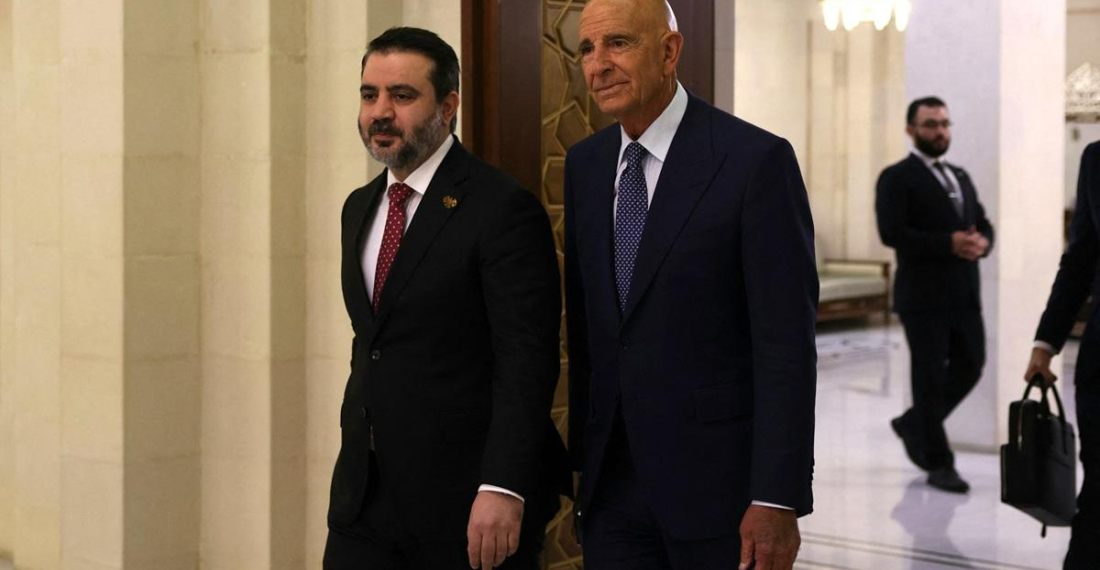A Syrian-Israeli ministerial meeting is taking place place on Thursday 31 July in Baku to discuss security matters in southern Syria, a diplomat told AFP. The meeting between Syrian Foreign Minister Asaad al-Shaibani and Israeli Minister of Strategic Affairs Ron Dermer follows a similar meeting between the two ministers in Paris last week. It will take place after an unprecedented visit by al-Shaibani to Moscow on Thursday, added the diplomat, who requested anonymity due to the sensitivity of the matter. Israel and Syria have technically been at war since 1948.
The Paris meeting focused mainly on "recent security developments and attempts to contain the escalation in southern Syria", according to Syrian state television. It came after deadly clashes in southern Syria's Druze-majority Sweida province which killed over 1400 people, according to the Syrian Observatory for Human Rights monitor.
The clashes initially pitted local Druze fighters against Sunni Bedouin tribes but soon saw the involvement of Syrian government forces and Israel, with the latter saying it wanted to protect the Druze.
Israel struck the Syrian presidential palace and the army headquarters in Damascus. The United States, an ally of Israel who has also expressed support for Syria's authorities, announced a ceasefire between the two sides overnight on July 18.
Before the violence in Sweida, Syrian and Israeli officials had met in Baku on July 12. Israel has occupied Syria's Golan Heights since 1967, annexing it in 1981 in a move not recognised by the international community.
The two signed a disengagement agreement a year after the 1973 war, establishing a UN-patrolled buffer zone between Syria and the occupied Golan Heights. Since the fall of longtime Syrian ruler Bashar al-Assad in December, Israel deployed its troops to the buffer zone and has carried out hundreds of strikes on Syria.
Meanwhile, Russia announced on Wednesday that Syria’s foreign minister will visit Moscow, the first official visit to Russia by an official in the new government in Damascus since former Syrian President Bashar Assad was ousted in a rebel offensive last year.
Russian Foreign Ministry spokesperson Maria Zakharova told the state news agency Tass that Foreign Minister Sergey Lavrov will host his Syrian counterpart, Asaad Al-Shibani, for talks in Moscow on Thursday. The two will discuss bilateral ties, as well as “international and regional issues,” the statement said.
There was no statement from Syria on the visit. Assad was an ally of Russia, and Moscow’s scorched-earth intervention in support of him a decade ago turned the tide of Syria’s civil war, helping to keep Assad in his seat for years. However, when insurgent groups launched a new offensive last year, Russia did not intervene again to save Assad.
Instead, Assad took refuge in Russia after his ouster. The former president later claimed in a statement posted on Facebook that he had wanted to stay in the country and continue fighting but that the Russians had pulled him out.
He said that he left Damascus for Russia’s Hmeimim air base in the coastal province of Latakia on the morning of Dec. 8, hours after insurgents stormed the capital. He hadn’t planned to flee, but the Russians evacuated him to Russia after the base came under attack.
Despite having been on opposite sides of the battle lines during the civil war, the new rulers in Damascus, headed by interim President Ahmad Al-Sharaa, have taken a pragmatic approach to relations with Moscow.
A Russian delegation visited Damascus in January, and the following month, Russia’s President Vladimir Putin had a call with Al-Sharaa that the Kremlin described as “constructive and business-like.” Some Russian forces have remained on the Syrian coast, and Russia has reportedly sent oil shipments to Syria.
Al-Sharaa publicly thanked Russia for its “strong position in rejecting Israeli strikes and repeated violations of Syrian sovereignty” after Israel intervened in clashes between Syrian government forces and armed groups from the Druze religious minority earlier this month.






